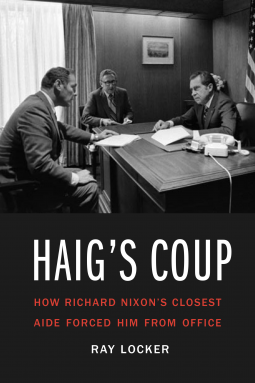
Haig's Coup
How Richard Nixon's Closest Aide Forced Him from Office
by Ray Locker
This title was previously available on NetGalley and is now archived.
Send NetGalley books directly to your Kindle or Kindle app
1
To read on a Kindle or Kindle app, please add kindle@netgalley.com as an approved email address to receive files in your Amazon account. Click here for step-by-step instructions.
2
Also find your Kindle email address within your Amazon account, and enter it here.
Pub Date 1 May 2019 | Archive Date 31 May 2019
University of Nebraska Press | Potomac Books
Talking about this book? Use #HaigsCoup #NetGalley. More hashtag tips!
Description
Haldeman and Ehrlichman had enforced the president’s will and protected him from his rivals and his worst instincts for four years. Without them, Nixon stood alone, backed by a staff that lacked gravitas and confidence as the Watergate scandal snowballed. Nixon needed a savior, someone who would lift his fortunes while keeping his White House from blowing apart. He hoped that savior would be his deputy national security adviser, Alexander Haig, whom he appointed chief of staff. But Haig’s goal was not to keep Nixon in office—it was to remove him.
In Haig’s Coup, Ray Locker uses recently declassified documents to tell the true story of how Haig orchestrated Nixon’s demise, resignation, and subsequent pardon. A story of intrigues, cover-ups, and treachery, this incisive history shows how Haig engineered the “soft coup” that ended our long national nightmare and brought Watergate to an end.
Advance Praise
“Ray Locker’s latest book is a bombshell! It will force us to consider what we thought we knew about the final year of Richard Nixon’s presidency and the role of Alexander Haig. Even Watergate aficionados will learn plenty—and yearn for more.”—Luke A. Nichter, author of The Nixon Tapes: 1973
“Ray Locker has done extraordinary work here: Haig’s Coup is a deep dig that will force a major reset of the perceived history of the Watergate era. I’m honored to have had an early peek at it. I learned a lot.”—Ed Gray, coauthor of In Nixon’s Web: A Year in the Crosshairs of Watergate
“Ray Locker is a probing newsman, an indefatigable researcher, and a talented historian. His return to the subject matter of the Nixon White House is good news to all students of the modern presidency, for there is no one better equipped to mine the remaining secrets of that tumultuous era. The truth is out there, and Ray Locker is the man to get it.”—James Rosen, former Fox News chief Washington correspondent and author of The Strong Man: John Mitchell and the Secrets of Watergate
Available Editions
| EDITION | Other Format |
| ISBN | 9781640120358 |
| PRICE | $49.95 (USD) |
| PAGES | 432 |
Links
Average rating from 8 members
Featured Reviews
 Tracy W, Reviewer
Tracy W, Reviewer
Having read the books by Bernstein and Woodward many years ago I was intrigued by the summary of this biography of General Alexander M. Haig Jr including newly declassified documentation. I wasn't disappointed as this is a fascinating read, showing a different perspective on the Watergate crisis and subsequent fallout.
The twisting and turning tale shows Haig as a man only out to protect one person in the top echelons of American politics, namely himself and had no hesitation in sacrificing those who knew too much or had conceivably more power than him.
I was able to read an advanced copy of this book thanks to Netgalley and the publishers in exchange for an unbiased review and would recommend it to anyone who is interested in the Watergate scandal or, more broadly, American 20th century history.
 Joseph S, Reviewer
Joseph S, Reviewer
A fascinating biography of a real-life ”Cigarette Smoking Man” -- Never in power but always able to manipulate those in power. Haig struggled to get into West Point, graduated in the bottom third of his class, and would later serve under Nixon. He rose to Brigadier General working under Kissinger in September of 1969, and by October. 1972 he had his fourth star-- skipping the rank of Lieutenant General in the process. His strategy to power came by gaining trust and turning on others -- Kissinger and Nixon included. Haig’s Coup is the history of the last few months of the Nixon presidency and how one man worked to control the chain of events that not only removed a president but also preserved his own record of government service. A engrossing read,
I was 7 years old in 1981. Prior to this book, I only knew Alexander Haig from his "I'm in control here at the White House" statement after Ronald Reagan was shot - more of a poor phrasing than an actual coup. This book describes Haig's time as Richard Nixon's chief of staff at the end of his presidency, and puts forth his plot to remove Nixon from the White House. "Plot" may be too strong a word, but after reading this I was convinced that he did orchestrate Nixon's downfall, bit by bit, until the president finally resigned from the presidency - going so far as to persuade Nixon to resign in the last few weeks and giving Gerald Ford the options for pardoning him to end the entire "national nightmare.".
 Jim C, Reviewer
Jim C, Reviewer
Watergate continues to intrigue
This is a detailed book that is not a quick read. The basic premise is that Al Haig, a military man with ambition who became Nixon’s Chief of Staff, engineered Nixon’s resignation whilst at the same time protected his own culpability in various White House abuses of power.
This is evidenced and repeated throughout the book by drawing on a vast range of players, commentators and documents. If all true, Nixon himself was incredibly naive and ill-served by an aide who seems to have risen without trace to the highest echelons of government.
The contention is also made that ‘Deep Throat’ was not just Mark Felt but an amalgam of characters including Haig – in fact with Haig as possibly the main contributor to Woodward & Bernstein’s unravelling of the Watergate saga.
Reading Ray Locker’s story was unsettling in just how many parallels there seem to be between Nixon/Trump and what transpired on their watch.
At one point, quoting from information given to Woodward by Haig, “…how really out of Hand Nixon was, how he had to be watched.” and that there was “an implied agreement between Haig, Kissinger, and the White House lawyers ‘to talk to each other to make sure Nixon didn’t do anything crazy.’”
Having read many books on Watergate I filled in some more blanks in my understanding, especially with regard to President Ford’s pardon for Nixon.
This was not a great period in American history and many things could have gone wrong with the process to allow Nixon and some or even all of his team to have escaped justice – some would argue that Nixon in fact did.
What I would now like to see is a new version of All The President’s Men that revisits the Watergate saga and provides greater insight and detail on just how Woodward and Bernstein managed to play such a large part in achieving Nixon’s downfall.
This book was provided as an advance copy by the publisher in return for an honest review.
I have posted a review on Amazon (link to follow)
 Sarah B, Reviewer
Sarah B, Reviewer
This is a well researched and very detailed account of President Nixon's last months in office when the people he thought were working in his best interests basically weren't. General Alexander (Al) Haig was brought in as Nixon's Chief of Staff after he lost several key members due to the start of the Watergate scandal to steady the ship, instead he took almost complete control over an increasingly unstable Nixon and in doing so took the opportunity to cover up his involvement in the spying ring at the expense of the president.
This isn't a quick read but the story flows very smoothly for a factually researched book that can often bog you down with notes.
Anyone interested in Watergate, Nixon or just wanting a fascinating look at recent events in history should read this.
Readers who liked this book also liked:
Debbie Young
General Fiction (Adult), Mystery & Thrillers, Women's Fiction


















